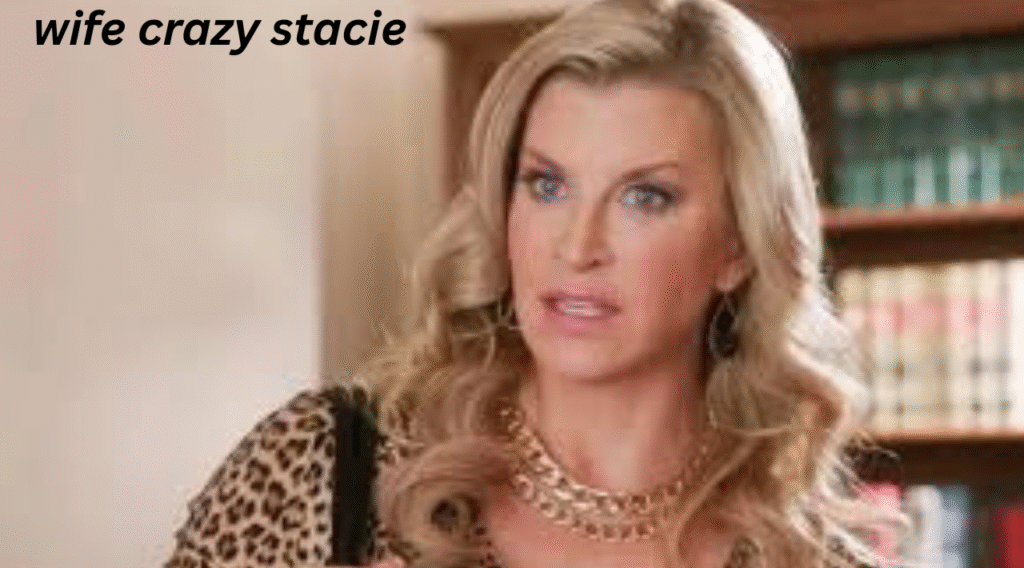In the ever-evolving realm of internet culture, few characters have captured as much attention—and confusion—as “Wife Crazy Stacie.” Whether she’s the star of a chaotic TikTok, the punchline in a meme, or the fictional antagonist in a wild Reddit story, Crazy Stacie has become a digital archetype. But who is she really? Is she satire, a stereotype, or just an inside joke that got out of hand?
As social media continues to blur the lines between real and unreal, figures like Stacie emerge as both entertainment and reflection. With her over-the-top behavior, dramatic flair, and explosive interactions, she’s the wife you hope isn’t real but can’t stop watching. This article dives deep into the origins, impact, and controversy surrounding the persona of “Wife Crazy Stacie,” a character who’s become symbolic of modern relationship chaos—online and off.
Who Is “Crazy Stacie” and Where Did She Come From?

“Crazy Stacie” didn’t arrive with a press release—she erupted onto the internet in snippets, videos, and exaggerated retellings of domestic drama. Some say she was born from viral TikToks showing a woman flipping out over minor inconveniences, while others trace her roots to Reddit threads where husbands recount unbelievable tales about their “crazy wives.” Over time, these stories began sharing common traits: explosive anger, irrational jealousy, and soap-opera-level conflict. Eventually, the composite character was nicknamed “Crazy Stacie.”
She may not be a single real person, but she embodies a concept familiar to many: the partner whose behavior is so extreme it’s hard to believe. Part meme, part cautionary tale, and entirely theatrical, Stacie has taken on a life of her own across digital platforms. From Instagram reels to satirical YouTube skits, she’s become a symbol of chaos in relationships—often exaggerated, sometimes misunderstood.
Importantly, “Crazy Stacie” isn’t a monolith. Some portrayals frame her as a misunderstood woman standing up for herself, while others paint her as a villain in a domestic drama. The ambiguity surrounding her origins and purpose adds to the intrigue. She’s no longer just a fictional character—she’s a pop culture icon in the wild world of internet storytelling.
Breaking Down the “Wife” Angle: Archetypes and Online Stereotypes
The use of the word “wife” in “Wife Crazy Stacie” isn’t incidental—it’s deeply tied to social media stereotypes and relationship archetypes. The trope of the “crazy wife” has long existed in comedy, film, and television. From sitcoms to stand-up routines, this caricature is often portrayed as overly emotional, controlling, or irrational. Online, this trope has been distilled into viral snippets where a woman’s dramatic reactions become the centerpiece for laughs or criticism.
However, in the digital age, these portrayals can quickly become exaggerated for entertainment. Stacie is frequently presented as the epitome of domestic dysfunction—snooping on her husband’s phone, throwing his PlayStation out the window, or creating public scenes that spiral into chaos. While some find humor in these antics, others critique them for reinforcing outdated gender norms and vilifying emotional expression.
The “wife” label also adds a layer of relational tension. It implies permanence and legal bonding, making her behavior not just chaotic but deeply impactful. The idea that one could be legally and emotionally tied to someone like Stacie adds a layer of horror to the humor. Yet, for many viewers, the fascination lies in the “what if” scenarios—what if your partner turned out to be a Stacie?
As much as “Crazy Stacie” may be a meme, she also invites reflection on how society views women, marriage, and emotional intensity. Is she a warning, a parody, or a misunderstood hero? The internet can’t seem to decide.
Iconic Moments, Quotes, and Memes Featuring Crazy Stacie
“Crazy Stacie” thrives on virality. Her story unfolds not through a single narrative, but through a tapestry of chaotic moments and unforgettable quotes. From TikTok skits that rack up millions of views to meme captions that spark thousands of comments, Stacie’s presence is stitched together by users who reinterpret her for their own entertainment.
One of the most iconic formats is the “Caught on Camera” trope—videos where a woman (allegedly Stacie) is filmed screaming at her partner, destroying his gaming console, or confronting a neighbor over petty disputes. Often staged, these clips blur the lines between performance and reality. A viral catchphrase like “You think I’m crazy? Wait till I find your other phone!” adds fuel to the fire, becoming shorthand for unpredictable partner behavior.
On platforms like Reddit, users write fictional “Am I The A**hole” stories featuring Stacie as the emotionally unstable antagonist. Whether she’s demanding her husband cut ties with his mother or throwing out his childhood memorabilia, Stacie is portrayed as someone who escalates minor issues into major meltdowns. These stories often go viral, inviting both ridicule and psychoanalysis from readers.
Meanwhile, Twitter (now X) and Instagram are filled with memes that use Stacie’s image—or actresses playing her—to depict relationship red flags. Her chaotic energy has even been used in reaction GIFs and stickers, making her a fixture in digital conversations about love, madness, and drama.
Cultural Impact and Controversy: Is “Crazy Stacie” Empowering or Problematic?
As with many viral archetypes, “Wife Crazy Stacie” walks a fine line between satire and stereotype. While her exaggerated behavior can be hilarious in fictional form, critics argue that she reinforces damaging tropes about women—especially the notion that strong emotions equate to irrationality or instability. This framing can trivialize real emotional struggles or vilify women for asserting themselves in relationships.
On the flip side, some interpretations see Stacie as a symbol of empowerment—a woman who refuses to be gaslit, manipulated, or ignored. In this light, her wildness is a reaction to years of built-up frustration, and her actions become less about madness and more about reclaiming control. This divide makes Stacie a Rorschach test for viewers: what you see in her often reflects your own views on relationships, gender roles, and communication.
There’s also a racial and socioeconomic undertone in how Stacie is portrayed. Many viral depictions rely on classist or sexist cues, turning her into a caricature of a “problematic” woman from a certain background. This can perpetuate harmful assumptions and reduce nuanced human behavior to a punchline.
Still, “Wife Crazy Stacie” is not going away anytime soon. She has become embedded in meme culture and continues to evolve with each new retelling. Whether you love her, fear her, or simply laugh at her, one thing is clear—Stacie has left her mark on the internet.
Conclusion
“Wife Crazy Stacie” is more than just a meme—she’s a cultural mirror reflecting everything from our collective anxieties about relationships to the performative nature of internet storytelling. As a digital persona, she encapsulates chaos, humor, and controversy all at once. Whether rooted in satire or real experiences, her character challenges us to reconsider how we consume, judge, and share personal stories online.
While some see her as a warning sign of what not to marry, others view her as a misunderstood antihero in a world of oversimplified labels. The internet has always thrived on extremes, and Stacie—loud, wild, and unforgettable—is the perfect storm for a viral persona.
FAQs
Is “Wife Crazy Stacie” a real person or just a meme?
A: Crazy Stacie is more of a fictional or composite character than a real individual. She’s a viral persona created and popularized through memes, videos, and stories that embody exaggerated domestic drama.
What platform made “Crazy Stacie” go viral?
A: TikTok and Reddit played major roles in popularizing her, although Instagram and X (formerly Twitter) also spread her image and memes widely.
Are there similar viral characters to “Crazy Stacie”?
A: Yes, characters like “Karen,” “Tradwife,” and “Psycho Ex” share similarities in how they caricature certain gendered behaviors for comedic or critical effect.
Why do internet users resonate with exaggerated personas like Stacie?
A: These characters tap into universal themes of relationship conflict, emotional extremes, and the chaos of daily life—making them both relatable and entertaining.
Is the meme considered offensive by any groups?
A: Yes, some critics argue it reinforces sexist or classist stereotypes, while others see it as a satire on relationship dynamics gone too far.
You May Also Read: https://zibbusiness.com/5starsstocks-com-nickel/





